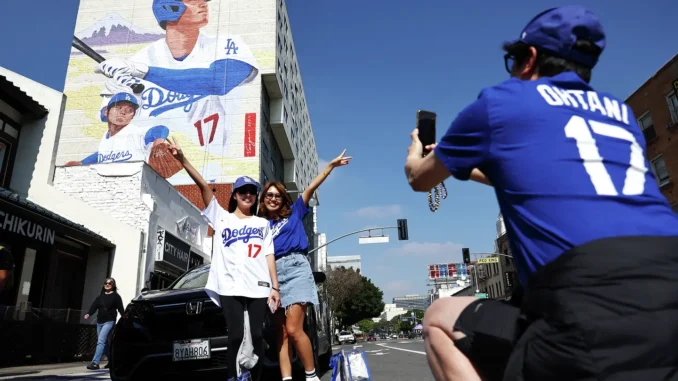
The Ohtani Effect: A Transformative Force in Los Angeles Tourism
The signing of baseball superstar Shohei Ohtani by the Los Angeles Dodgers has had an extraordinary and rapid impact on the city’s tourism economy, a phenomenon now widely dubbed “The Ohtani Effect.” While sports figures have long influenced local economies through ticket and merchandise sales, Ohtani’s singular appeal as a two-way player and a global icon has created a unique ripple effect that extends far beyond Dodger Stadium. His arrival has not only driven a massive surge in Japanese visitors to Los Angeles but has also revitalized local neighborhoods and reshaped the city’s branding as a global sports and entertainment capital. This essay will explore the multifaceted ways in which Ohtani’s presence has acted as a “tourism unicorn,” generating unprecedented economic and cultural benefits for the Los Angeles area.
The most immediate and quantifiable impact of the “Ohtani Effect” is the dramatic increase in tourism from Japan. According to the Los Angeles Tourism & Convention Board, Japanese visitation to the city has surged, with forecasts projecting a significant rise in visitor numbers, making Japan one of LA’s top international markets. What is particularly remarkable is that between 80% to 90% of these Japanese visitors are now including a trip to Dodger Stadium in their itinerary, often purchasing tickets to multiple games, sometimes as many as three in a single trip. This is a behavior distinct from that of many other international tourists, who might only visit a stadium once. Major Japanese tour operators like JTB have responded to this demand by creating specific travel packages centered around Dodgers games, demonstrating the direct link between Ohtani’s star power and the travel industry’s operational strategies. This influx is a bright spot for LA’s tourism industry, which has faced challenges in recent years due to global events.
Beyond the numbers, Ohtani’s influence has created a tangible ripple effect across the local Los Angeles economy. The surge in visitors has been a boon for businesses in areas adjacent to Dodger Stadium, such as the historic neighborhood of Little Tokyo. For years, Little Tokyo faced economic struggles and was even named one of the country’s most endangered historic places. Now, the neighborhood is experiencing a revitalization, with local businesses, restaurants, and hotels seeing a significant boost in traffic on game days. The Miyako Hotel, for example, has reported that a staggering 98% of its occupants on game days are in town specifically to see Ohtani play. The presence of Ohtani-themed murals and Japanese-speaking staff in the area further solidifies the cultural and economic bridge he has created. This demonstrates how a single athlete can become a powerful catalyst for urban renewal and cultural exchange, drawing tourists to parts of the city they may not have previously considered visiting.
The economic impact also extends to Dodger Stadium operations and the Dodgers franchise itself. The team has made numerous changes to accommodate its new Japanese-speaking fanbase, including offering stadium tours in Japanese and incorporating popular Japanese and Asian food items into its concession stands. The merchandise sales related to Ohtani have been record-breaking, with his jersey becoming the most popular in Major League Baseball. Furthermore, the Dodgers have secured partnerships with over a dozen new Japanese sponsors, who are eager to align their brands with one of the most marketable athletes in the world. This financial windfall—estimated to be in the tens of millions of dollars annually—is a direct result of Ohtani’s star power and his ability to attract a new, international audience to the sport. His global appeal is not just a benefit to the team but also elevates the entire league, increasing viewership and interest in MLB far beyond its traditional American fanbase.
Shohei Ohtani’s signing with the Los Angeles Dodgers has transcended a typical sports transaction to become a significant driver of the city’s tourism and economy. “The Ohtani Effect” is a testament to the power of a global superstar to not only boost ticket sales and merchandise but to create a broad and lasting economic impact on an entire metropolitan area. His influence has revitalized local neighborhoods, transformed the fan experience at Dodger Stadium, and positioned Los Angeles as a key destination for international visitors. This unique phenomenon illustrates that in today’s globalized world, a single athlete can be a powerful force for economic growth and cultural connection, solidifying LA’s position as a global sports and entertainment hub.
Leave a Reply